Theatre Review
Light Opera Theatre of Sacramento
Trial by Jury and The Sorcerer ─ August 11-20, 2023
Gilbert & Sullivan has returned full-force to
Sacramento! Since its founding in 1982, Light Opera Theatre Sacramento
has produced a nearly unbroken string of Gilbert & Sullivan
performances.
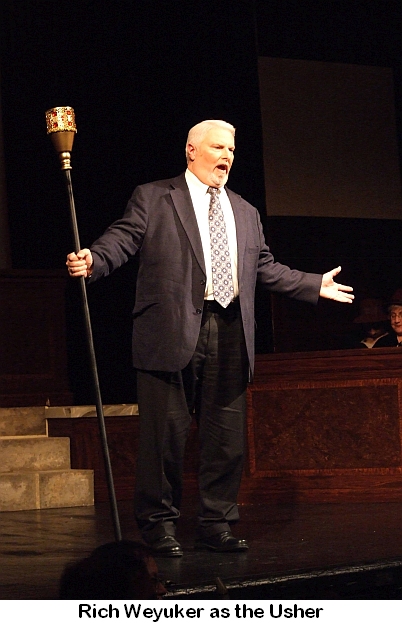 That was until the pandemic prevented their mid-summer
shows in 2020 and 2021. Then, after the first week’s performance
of Iolanthe in 2022, Covid-19 hit the cast, and the second week had to
be cancelled. With a healthy cast and orchestra, LOTS is now offering a
G&S double-feature: Trial by Jury and The Sorcerer. I attended the
opening night of these productions, performed as usual in recent years
in the intimate comfort of Sacramento’s 24th Street Theater at Sierra
2.
That was until the pandemic prevented their mid-summer
shows in 2020 and 2021. Then, after the first week’s performance
of Iolanthe in 2022, Covid-19 hit the cast, and the second week had to
be cancelled. With a healthy cast and orchestra, LOTS is now offering a
G&S double-feature: Trial by Jury and The Sorcerer. I attended the
opening night of these productions, performed as usual in recent years
in the intimate comfort of Sacramento’s 24th Street Theater at Sierra
2.
Click here to open the performance’s program in a new window. In it, Director Robert Vann explains that he had set these two comic operas in post-war England of the 1920s, rather than the 1870s when they were written. With that explanation, we in the audience were primed to see costumes more representative of Downton Abbey than the latter part of the Victorian era. Accordingly, we were welcomed by a 1920s train conductor who – in character and with humor – gave us the typical pre-performance announcements regarding restrooms, intermission and a very pointed warning about the use of smart phones. He was interrupted by the Usher in Trial by Jury who banged his 6-foot impressively styled ceremonial rod on the floor – something he did frequently throughout the subsequent performance while demanding, “Silence in Court!”
Briefly, the plot of Trial by Jury is that a woman is suing a man for breach of promise. Then in a parody of the English judicial system, the judge winds up with the woman.
Interrupting the Usher’s rod banging, the 12 jurors (all men) and the 12 members of the public (all women) started the show with the first of their ensemble singing. As they did, I was struck with the energy and expressiveness with which they sang. A casual conversation with a member of the LOTS production staff revealed that, especially for the women, the casting for the choral parts of these operas was quite competitive. And indeed, it seemed to me that there were many strong, experienced singers in both the men’s and women’s sections. But eliciting a consistent choral sound from such a group is no small challenge, and for the quality of what I heard, a lot of the credit is due to Vocal Director Anne-Marie Endres, who, over just the past decade, has built an impressive resume in the Sacramento performing arts community as a singer, vocal instructor, conductor, actor, and pianist.
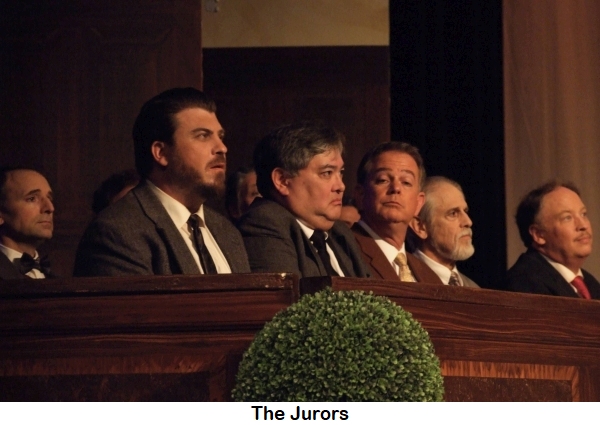 |
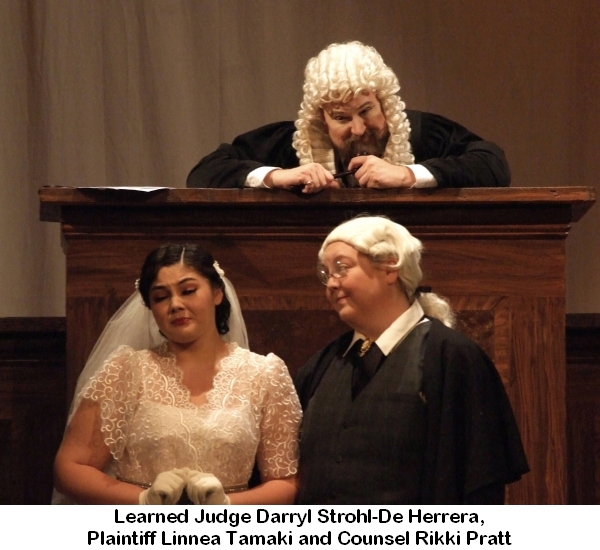 |
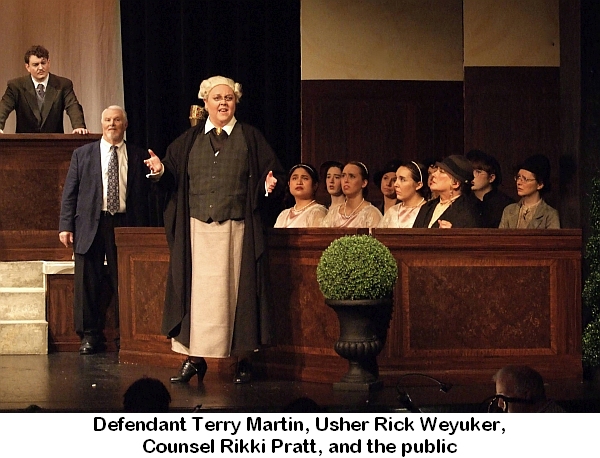 |
The words to all of the singing this evening were projected above the
stage, and this was very helpful because so much of the pleasure of
Gilbert and Sullivan’s music is in the clever lyrics of W.S. Gilbert. No
one would want to miss any of them! And there was one moment when the
supertitles delivered a surprise. Early in Trial by Jury the Defendant
was aware that all were against him, and so he screwed up his courage by
telling himself these words, “Be firm, be firm, my pecker.” Anticipating
the audience’s assumption about the meaning of the word, the supertitles
noted that in Victorian England, the phrase meant to “keep up your
spirits” – giving the audience an extra laugh not intended by Gilbert.
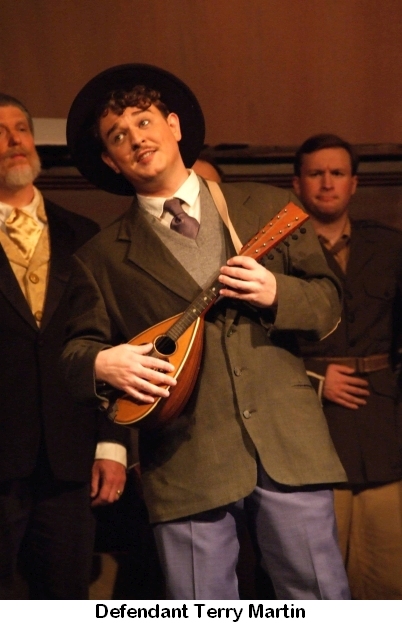
Besides the excellent ensemble singing, the production was buoyed by
fine solo and small group singing: the Usher’s (Rick Weyuker’s) forceful
bass, the Plaintiff’s (Linnea Tamaki’s) strong high register, the
Defendant’s (Terry Martin’s) clearly delivered tenor, as well as the nicely
blended voices of the Bridesmaids, for a few examples.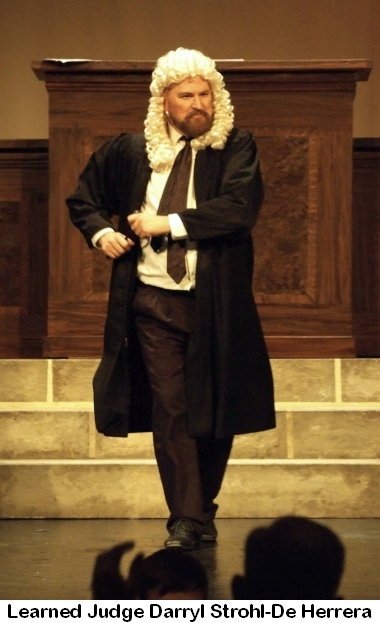 In a nod to the
blossoming of women’s rights in England in the 1920s, Director Vann cast
a woman as the Counsel for the Plaintiff (Rikki Pratt). The vocal duel
between high-voice Pratt and low-voice Weyuker was especially fun to see
and hear. And speaking of duels, I recall at least one rousing
back-and-forth between the men of the jury and the women courtroom
observers.
In a nod to the
blossoming of women’s rights in England in the 1920s, Director Vann cast
a woman as the Counsel for the Plaintiff (Rikki Pratt). The vocal duel
between high-voice Pratt and low-voice Weyuker was especially fun to see
and hear. And speaking of duels, I recall at least one rousing
back-and-forth between the men of the jury and the women courtroom
observers.
I was trying to recall how the Learned Judge’s (Daryl Strohl’s) voice impressed me, and to be honest, I don’t recall its quality at all. That is because Strohl’s acting was just mesmerizing. The judicial bench was elevated above the rest of the set, and Strohl “entered” by slowly rising from behind it, with his wig covering his face, as if he were drunk or had been napping. This was the beginning of a string of antics on his part that made him (deservedly) the almost constant focus of audience attention as he fully embraced the humorous possibilities of his role. Indeed, whether coming from one of the singers or from the inspiration of Director Vann, there were many clever touches or gags that subtlely added to the pleasure of this performance: (1) when there was discussion of monetary damages, the Defendant quietly made a zero with the index finger and thumb of both hands, (2) the judge was constantly throwing papers over his shoulder, and (3) when the Defendant tried to read a law book, someone had to turn it right-side up for him. These are just the few examples I was able to record in my notes.
But clever touches aside, the principal pleasure of this brief, 35-minute opera was in the singing (indeed, there was no spoken dialog). And I especially recall several glorious moments when the singing was (or at least seemed to be) contrapuntal and at full voice between the men and women.
The Sorcerer
After a very brief intermission, we in the audience heard the sound of a train arriving, followed by the entrance of the conductor who had greeted us at the beginning. Also reappearing were characters from Trial by Jury. Specifically, the conductor took tickets, first from the three Bridesmaids (who had stickers reading “Professional Bridesmaids” on their suitcases, a subtle reference to the G&S opera, Ruddigore and the "Rederring Professional Bridesmaids"). Then he took tickets from the Learned Judge and Plaintiff, who by the end of the previous action had decided to wed and were perhaps now on their honeymoon trip. But then there was a more mysterious character, who fooled the conductor by giving him a used ticket. It was the Sorcerer, John Wellington Wells (Charlie Baad), giving us an elegant segue into the next opera.
Competently directed by Glenn Disney of the Sac State School of
Music, the orchestra had given excellent support to the singers in Trial
by Jury, and finally we were able to hear them perform by themselves in
an extended overture consisting of many lively, appealing melodies.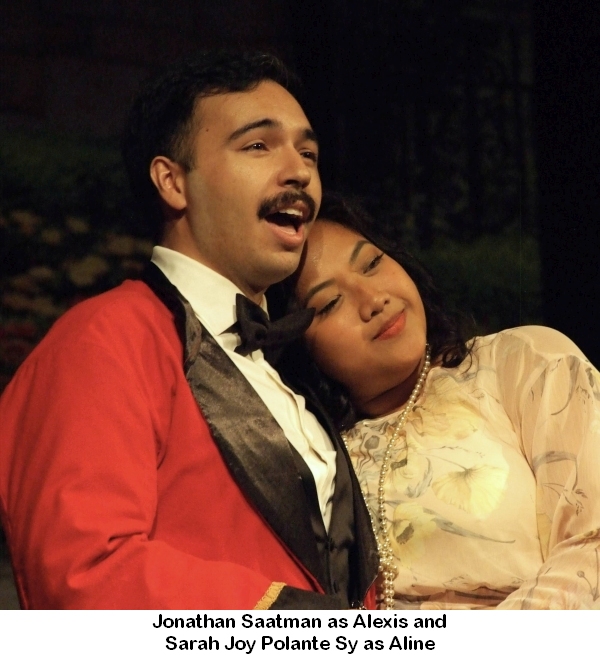
When the curtain opened for The Sorcerer, one of my first impressions
was of the very realistic background scenes. And as the show progressed,
I became aware of the variety in period-appropriate costumes that gave a
great deal of visual interest whenever the cast filled the stage.
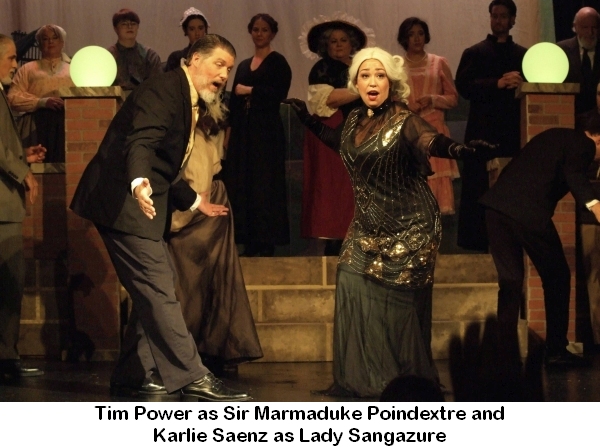
Briefly, the plot of this opera revolves around the two young, high-born lovers, Alexis (Jonathan Saatman) and Aline (Sara Joy Polante Sy). They are to be wed, and his father and her mother are likely to follow suit. Alexis gets the idea that the whole village should share their bliss, so he arranges with a sorcerer to slip a love potion (“philtre”) into the communal tea at a village gathering. The idea is that people will fall in love with the first person they see on waking – regardless of age, infirmity, social position, etc. Of course, It all goes wrong, especially when Aline takes the potion and falls in love with the town vicar. The only way to restore normalcy is for either the sorcerer or Alexis to die. The sorcerer meekly accepts his fate, and all ends well (except for the sorcerer, of course).
In scene after scene, we had a tour-de-force of the varieties of
love. It started with young Constance (Brianna Brock) speaking to her
mother, Mrs. Partlet (Jennifer Fiedler) and confessing her yearning for
the old vicar, Dr. Daly (Ryan Gordon-Morgan). In W.S. Gilbert’s witty
verse, we had a first taste of the frustrations of lovelorn desires and
regrets of missed opportunities. And of course, there was a good helping
of humor, mostly provided by Mrs. Partlet’s inspired comic acting. And
then we saw what was just the first of the show’s sight gags
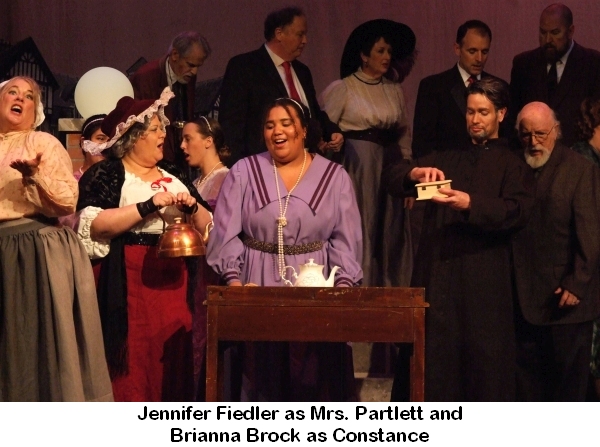 when Mrs.
Partlet started to walk away from her daughter, and the latter hooked
her arm roughly to keep her from leaving.
when Mrs.
Partlet started to walk away from her daughter, and the latter hooked
her arm roughly to keep her from leaving.
The wedding scene was next, bringing the entire cast to the stage.
The singing, of course, was grand, but there was also dancing by 5
couples. (What wedding doesn’t include dancing?) And then there were
more sight gags: (1) when Mrs. Partlet tried to signal Aline to throw
her bouquet to Constance or (2) when, at the end of the dance, the women
now standing behind their partner, lifted their right leg to be grabbed
(without looking) by their partner. OK, maybe it doesn’t sound funny to
describe it, but it made us all laugh. Also, the Judge and Plaintiff
from the previous opera were part of the wedding party, and their
actions brought more laughs.
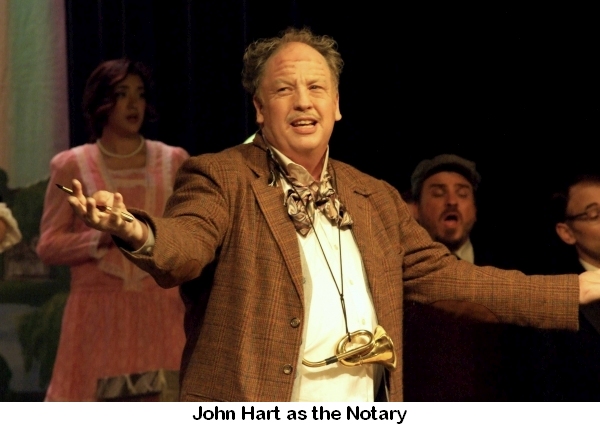
Part of this scene was an extended interaction between Alexis’ father, Sir Marmaduke Pointdextre (Tim Power) and Aline’s mother, Lady Sangazure (Karlie Saenz). It was at this point that I wrote in my notes how intellectually satisfying were the rhymes in their solos (something that surely all Gilbert and Sullivan fans feel). Both performers delivered their lines expertly, while acting to restrain their passion for each other. Then the climax of the singing in this scene came when the chorus, celebrating the signing of the marriage document, echoed Alexis’ and Aline’s lines, “By their Act and Deed!” The crescendo made the moment quite thrilling.
With Alexis and Aline having been left alone by the villagers, Alexis
disclosed (to Aline’s dismay) his crazy plot to use a love potion on the
people of the village. Potions were a specialty of the Sorcerer, John
Wellington Wells (Charlie Baad), who now joined them. Before going on, I
must add a
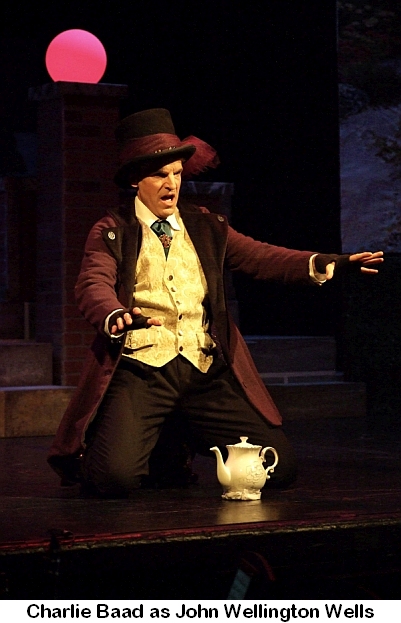 word about Charlie Baad. I first saw him in the LOTS
production of The Yeomen of the Guard in 2019. He impressed me then, and
he impressed me again tonight. He is the son of Mike Baad, who along
with Debbie Baad, founded LOTS in 1982. (Mike and Lawrence Baad were
villagers in tonight’s production.)
word about Charlie Baad. I first saw him in the LOTS
production of The Yeomen of the Guard in 2019. He impressed me then, and
he impressed me again tonight. He is the son of Mike Baad, who along
with Debbie Baad, founded LOTS in 1982. (Mike and Lawrence Baad were
villagers in tonight’s production.)
Mr. Wells entered in a costume that was mysterious and singularly appropriate for a sorcerer. In his subsequent solo (“My name is John Wellington Wells”), he demonstrated his mastery of Gilbert and Sullivan’s fast-paced, tongue-twisting lyrics, along with a bit of a Cockney accent and spooky acting.
Alexis and Mr. Wells proceeded to discuss the logistics of the love potion (or “philtre”), and somehow there was a reference to free delivery by Amazon Prime. Of course, all of us in the audience loved the idea of sneaking in a contemporary reference. (Actually, there was a previous mention of “bitcoin.”)
In true Gilbert and Sullivan fashion, this evening was
full of references to items, places and practices that were familiar to
Victorian audiences – but are completely obscure today. For these, I was
grateful to have read the libretto before attending tonight, and while
reading, I found myself frequently going to an online G&S lexicon. As
for the rest of the audience, I’m sure that during the performance, the
context of unfamiliar terms gave the G&S novices in the audience an
adequate understanding of what was being referred to. There was one
reference, though, that I was especially glad to have discovered in
advance. In many places (and especially at the end) there were lines
like this, “The rollicking bun/ And the gay Sally Lunn!). It meant a lot
to me to know that the “gay Sally Lunn” is a tea cake, named after a
late-eighteenth century street vendor in Bath.
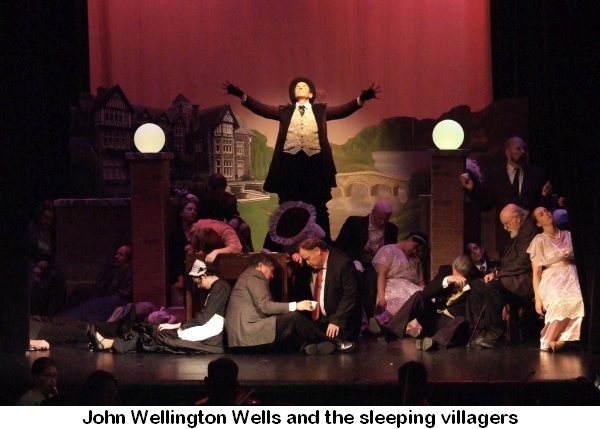
With the haggling over terms for the deal completed, Mr. Wells delivered the philtre, which was placed in a teapot after a frightening incantation, accompanied by lighting and sound effects. Spirits are given lines in the libretto, but tonight they were not embodied. Presently, the townspeople entered for the wedding banquet, and along with the joyful dancing and singing, tiny teacups were distributed to each person. They soon began to struggle with the effects of the philtre, and Act I ended with everyone collapsing to the ground.
As the villagers wakened in Act II, they formed into improbable pairs: a tall woman with a short man, a young man with an old woman and vice-versa, low-born with high-born, etc. They danced around in simple choreography, sometimes quite comical, as was the case with young Constance and the very old and infirm Notary (John Hart), who conversed with her with the aid of an ear trumpet. This part of the action was full of sight gags which kept the audience laughing.
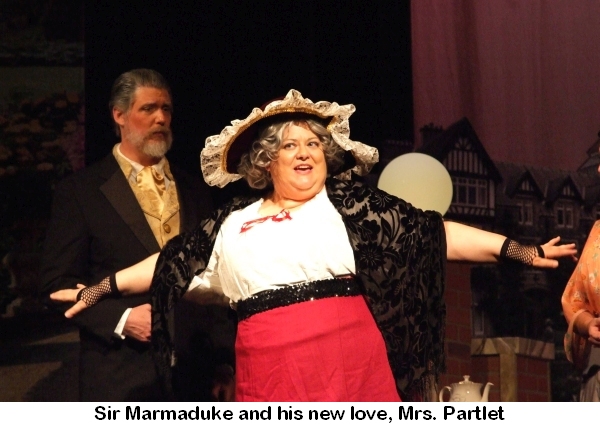 The
pairings soon became problematic for Alexis and Aline, as they saw their
parents inappropriately mated with others: Sir Marmaduke with Mrs. Partlet, and Lady Sangazure with a hesitant Mr. Wells. The exchanges between the couples
delivered some of the best G&S wit. For example, Constance enumerated
all the flaws of the Notary, and concluded: “You’re everything that I
detest,/ But still I love you dearly!” Then Mr. Wells (who didn’t take
the philtre) tried to ward off Lady Sangazure’s expressions of
affection: “Hate me! I drop my H’s – have through life!” To this she
says, “Love me! I’ll drop them too!” Especially fun in this exchange was
when Mr. Wells said: “Hate me! I often go to Placerville!” G&S’s
original word was “Rosherville,” which, according to the G&S lexicon,
was “a lower-class amusement park.” Of the many examples of uninhibited
comic acting, I was particularly deighted by Lady Sangazure’s cleverly
choreographed vamp of the reluctant Mr. Wells.
The
pairings soon became problematic for Alexis and Aline, as they saw their
parents inappropriately mated with others: Sir Marmaduke with Mrs. Partlet, and Lady Sangazure with a hesitant Mr. Wells. The exchanges between the couples
delivered some of the best G&S wit. For example, Constance enumerated
all the flaws of the Notary, and concluded: “You’re everything that I
detest,/ But still I love you dearly!” Then Mr. Wells (who didn’t take
the philtre) tried to ward off Lady Sangazure’s expressions of
affection: “Hate me! I drop my H’s – have through life!” To this she
says, “Love me! I’ll drop them too!” Especially fun in this exchange was
when Mr. Wells said: “Hate me! I often go to Placerville!” G&S’s
original word was “Rosherville,” which, according to the G&S lexicon,
was “a lower-class amusement park.” Of the many examples of uninhibited
comic acting, I was particularly deighted by Lady Sangazure’s cleverly
choreographed vamp of the reluctant Mr. Wells.
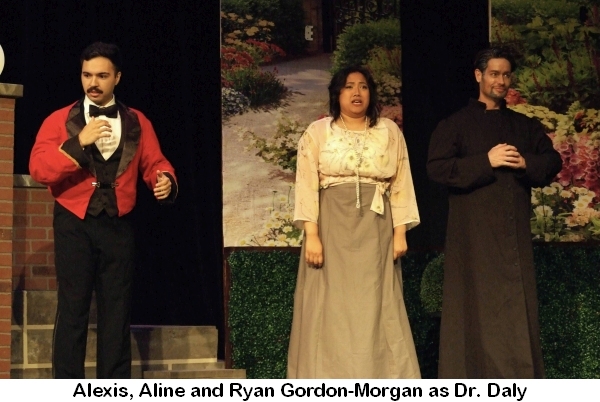
As with Trial by July, I was constantly impressed with the ensemble singing in The Sorcerer, especially the strong female chorus. And among the solo singers, I heard light voices and dark voices, but I didn’t feel that there was a single weak voice in this production. For me, one musical highlight in Act II was the quintet performed by Alexis, Aline, Sir Marmaduke, Mrs. Partlet, and Dr. Daly – with several moments of delightful harmonies. I also especially enjoyed the duets where both parties were singing different words simultaneously.
The climax of Act II came when Aline drank the philtre, and she and Dr. Daly, the town’s vicar, become enamoured of one another. Alexis was enraged at the loss of Aline’s affections, and to calm the situation, Mr. Wells explained that all the spells might be broken by the death of himself or Alexis. Bombarded with a chorus of “Die thou,” Mr. Wells meekly accepted the verdict of the villagers and walked off stage, though I would have preferred to see him fall through a trap door. At this point, the spell was broken, and the opera drew to a close, while all sang rejoicingly at the prospect of having “The eggs and the ham/ And the strawberry jam,/ The rollicking bun/ And the gay Sally Lunn!”
Of course, it’s all silliness – but charming, clever, musical, Gilbert & Sullivan silliness. It has lived for 150 years, and will no doubt delight audiences, as tonight’s was, for another 150 years. And sincere thanks are due to Director Robert Vann, the talented cast and orchestra, and the rest of Light Opera Theatre of Sacramento for keeping this treasured art form alive in our community.
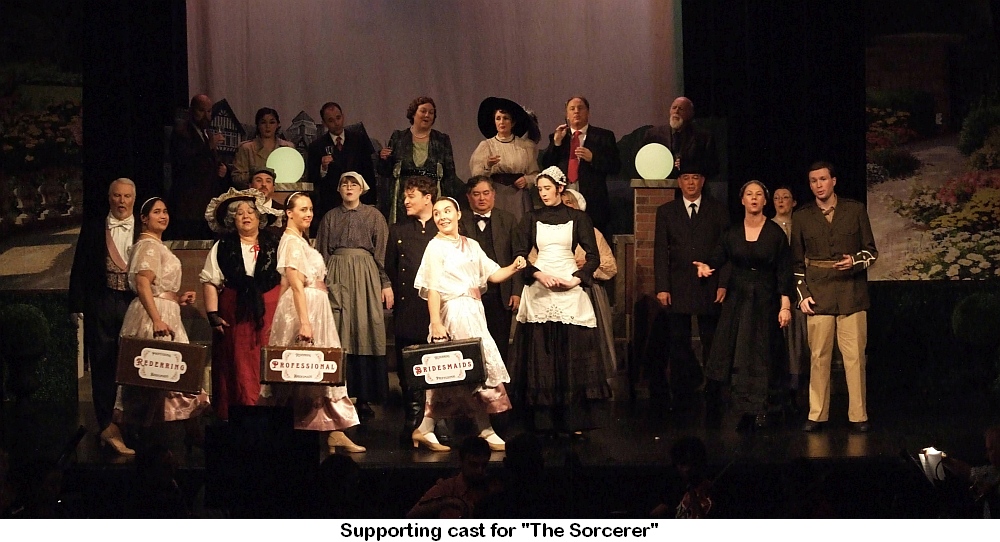
Dick Frantzreb is editor of the Capital Region Performance Gallery. In recent years, he also edited the Sacramento Choral Calendar and the Placer Performance Calendar, and he was a co-founder and past President of the Sacramento Valley Choral Coalition. He has been loving live performances in the greater Sacramento area and writing about them since 2012.